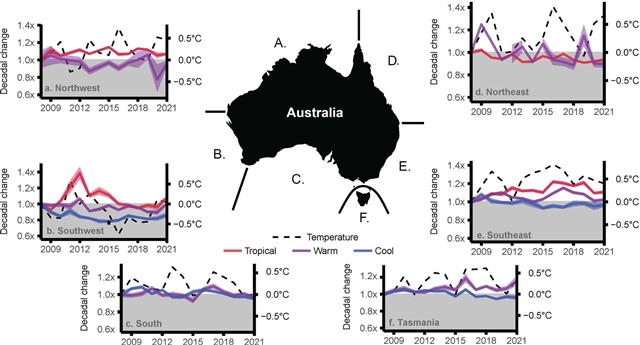
澳大利亚塔斯马尼亚大学Edgar, Graham J.及其研究小组的一项最新研究提出,在海洋变暖的十年中,整个大陆的浅礁生物的数量都在减少。2023年3月22日出版的《自然》杂志发表了这项成果。
研究人员评估了澳大利亚各地1636个地点的1057种常见浅礁物种,在过去十年的种群数量趋势。大多数种群在此期间减少,包括许多热带鱼、温带无脊椎动物(特别是棘皮动物)和澳大利亚西南部大型藻类,而珊瑚种群保持相对稳定。种群数量下降通常发生在热浪年,当地水温比2008年高出0.5摄氏度以上。在热浪之后,物种丰度在暖区边缘呈下降趋势,在冷区边缘呈上升趋势。
在寒冷的纬度地区,超过30%的浅水无脊椎动物物种表现出很高的灭绝风险,它们受深海屏障限制,数量迅速下降,阻止了它们随着温度上升而向极地撤退。因此人们需要加大保护力度,以保护温带海洋生态系统,这些生态系统受到了极大的威胁,其中包括具有深刻进化根源的物种。在更广泛的社会需求,有效适应相互作用的人为和自然压力的基础上努力,是扩大对物种数量趋势的监测。
据了解,人类社会依赖于自然,但在缺乏对物种数量的系统监测的情况下,人类社会的生态基础是否处于危险之中仍不明确。在海洋领域,关于物种波动的知识尤其不足。
附:英文原文
Title: Continent-wide declines in shallow reef life over a decade of ocean warming
Author: Edgar, Graham J., Stuart-Smith, Rick D., Heather, Freddie J., Barrett, Neville S., Turak, Emre, Sweatman, Hugh, Emslie, Michael J., Brock, Danny J., Hicks, Jamie, French, Ben, Baker, Susan C., Howe, Steffan A., Jordan, Alan, Knott, Nathan A., Mooney, Peter, Cooper, Antonia T., Oh, Elizabeth S., Soler, German A., Mellin, Camille, Ling, Scott D., Dunic, Jillian C., Turnbull, John W., Day, Paul B., Larkin, Meryl F., Seroussi, Yanir, Stuart-Smith, Jemina, Clausius, Ella, Davis, Tom R., Shields, Joe, Shields, Derek, Johnson, Olivia J., Fuchs, Yann Herrera, Denis-Roy, Lara, Jones, Tyson, Bates, Amanda E.
Issue&Volume: 2023-03-22
Abstract: Human society is dependent on nature, but whether our ecological foundations are at risk remains unknown in the absence of systematic monitoring of species’ populations. Knowledge of species fluctuations is particularly inadequate in the marine realm. Here we assess the population trends of 1,057 common shallow reef species from multiple phyla at 1,636 sites around Australia over the past decade. Most populations decreased over this period, including many tropical fishes, temperate invertebrates (particularly echinoderms) and southwestern Australian macroalgae, whereas coral populations remained relatively stable. Population declines typically followed heatwave years, when local water temperatures were more than 0.5°C above temperatures in 2008. Following heatwaves, species abundances generally tended to decline near warm range edges, and increase near cool range edges. More than 30% of shallow invertebrate species in cool latitudes exhibited high extinction risk, with rapidly declining populations trapped by deep ocean barriers, preventing poleward retreat as temperatures rise. Greater conservation effort is needed to safeguard temperate marine ecosystems, which are disproportionately threatened and include species with deep evolutionary roots. Fundamental among such efforts, and broader societal needs to efficiently adapt to interacting anthropogenic and natural pressures, is greatly expanded monitoring of species’ population trends.
DOI: 10.1038/s41586-023-05833-y
Source: https://www.nature.com/articles/s41586-023-05833-y
Nature:《自然》,创刊于1869年。隶属于施普林格·自然出版集团,最新IF:69.504
官方网址:http://www.nature.com/
投稿链接:http://www.nature.com/authors/submit_manuscript.html
